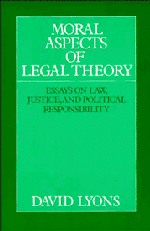Book contents
- Frontmatter
- Contents
- Preface
- Acknowledgments
- 1 The internal morality of law
- 2 On formal justice
- 3 Legal formalism and instrumentalism - a pathological study
- 4 Moral aspects of legal theory
- 5 Formal justice and judicial precedent
- 6 Derivability, defensibility, and the justification of judicial decisions
- 7 Constitutional interpretation and original meaning
- 8 A preface to constitutional theory
- 9 Basic rights and constitutional interpretation
- 10 Critical analysis and constructive interpretation
1 - The internal morality of law
Published online by Cambridge University Press: 10 December 2009
- Frontmatter
- Contents
- Preface
- Acknowledgments
- 1 The internal morality of law
- 2 On formal justice
- 3 Legal formalism and instrumentalism - a pathological study
- 4 Moral aspects of legal theory
- 5 Formal justice and judicial precedent
- 6 Derivability, defensibility, and the justification of judicial decisions
- 7 Constitutional interpretation and original meaning
- 8 A preface to constitutional theory
- 9 Basic rights and constitutional interpretation
- 10 Critical analysis and constructive interpretation
Summary
The distinctive doctrine of Natural Law theory often seems to be that an unjust law is not a law at all. An unjust law is like counterfeit currency, which causes trouble because it so closely resembles and may be taken for the real thing. But unjust law is not genuine law. And thus it deserves no respect.
Unfortunately, law can be, and much too often is, bad or unjust. What seems distinctive about Natural Law, therefore, is false – but so plainly false that the doctrine deserves a new reading.
Other ways of understanding natural law may be inferred from the obvious concerns of many Natural Lawyers. One is that law be subject to moral assessment. This turns the doctrine around. Laws are not necessarily right or morally neutral but can be good or bad, just or unjust. There are moral standards independent of the law that can be applied to judge it. Another concern is that the obligation to obey the law be recognized as having limitations. Natural Lawyers may be taken as saying that no one has any valid and binding obligation to obey an unjust law. But views like these, while avoiding the paradox, also seem to lack the spirit of Natural Law. For they do not imply that law and morals are essentially connected in a special way.
Perhaps Natural Lawyers have really wanted to press only such claims on us – none that would seem philosophically unrespectable to-day.
- Type
- Chapter
- Information
- Moral Aspects of Legal TheoryEssays on Law, Justice, and Political Responsibility, pp. 1 - 12Publisher: Cambridge University PressPrint publication year: 1993



